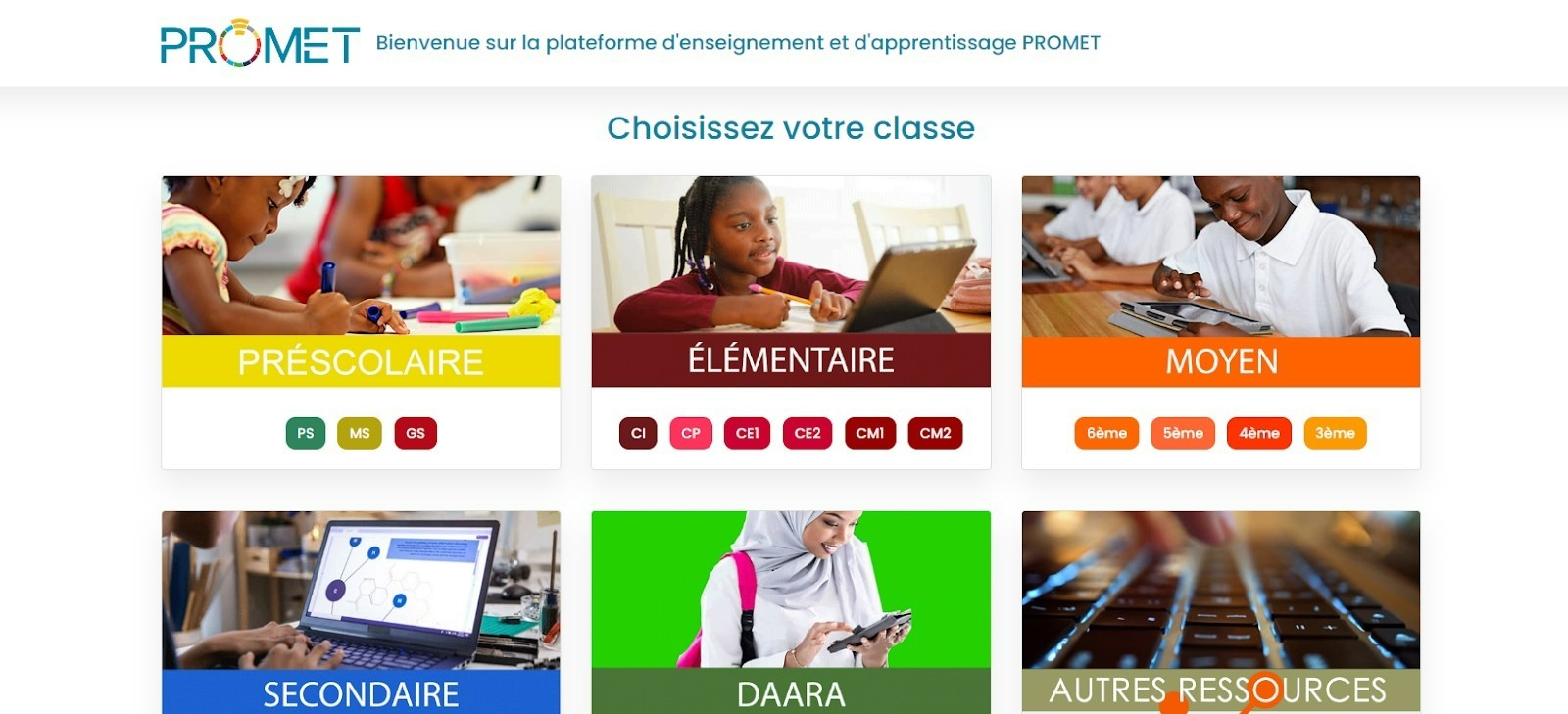E-Government Development in Senegal
The history of Senegalese e-Government can be traced back to the beginning of the century to the launch of an administrative procedures portal by Agence de l’informatique de l’Etat (ADIE) in 2006, as indicated in the joint UNDP and the Panos Institute West Africa analysis “E-governance and Citizen Participation in West Africa: Challenges and Opportunities”.
Being among the most developed in West Africa, the telecommunications infrastructure of Senegal provides a foundation for the successful digitalisation of public administration: Internet penetration in the country reached 58% in 2021 showing an explosive growth since 2011 (10%), according to the World Bank. The number of mobile broadband subscriptions in Senegal exceeded 15,88 million subscriptions, as indicated by the ITU data.
In 2016, in compliance with policy recommendations set in AU’s Digital Transformation Strategy for Africa 2020-2030, recognising the value of investing in e-Government and adopting a framework document promoting implementation and use of public e-services, within the scope of Plan for an Emerging Senegal (Plan Sénégal émergent, PSE) the Senegalese Ministry of Digital Economy and Telecommunications (Ministère de l'Economie Numérique et des Télécommunications, MCTEN), an entity overseeing the digital sector of the country, developed the “Digital Senegal 2025” ("Sénégal numérique 2025", DS2025) strategy. In 2020, the representative of the United Nations Development Programme in Senegal highlighted the organisation’s willingness to support the country in achieving the goals set in “Digital Senegal 2025”.
The total cost of the 28 reforms and 69 projects planned for the period 2016-2025 is estimated at 1,361 billion CFA francs (an equivalent of 2.3 billion USD), 73% of the total cost are to be financed by the private sector, 17% – by the public sector and 10% – by public-private partnership (PPP).
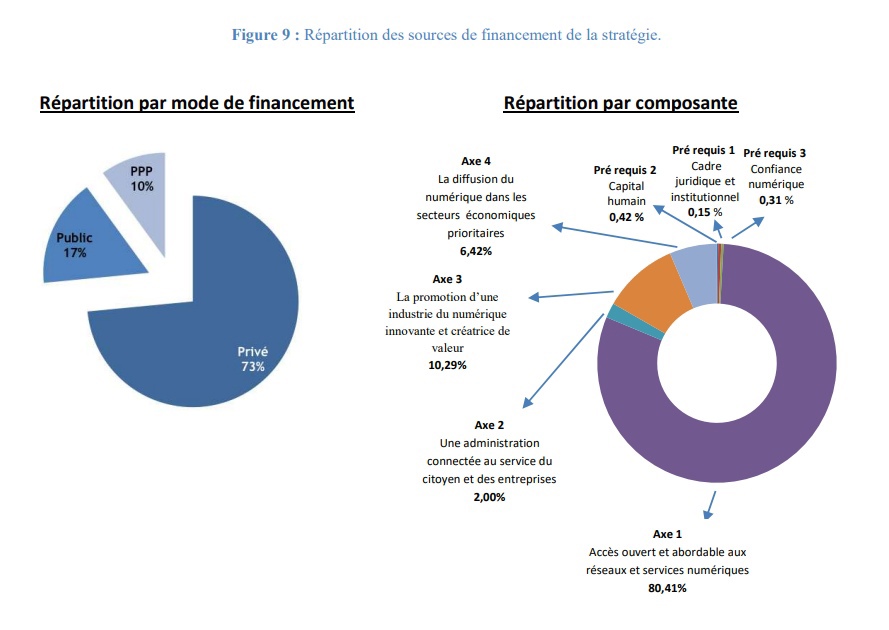
Source: Sénégal numérique 2025 (budget sources)
In particular, the Strategy envisages creation of 35,000 direct and 162,000 indirect jobs by 2025, boosting the digital sector contribution to GDP by 10% (as of today, according to the information posted on the Senegalese Presidential website, the digital sector accounts for 6.3% of GDP in monetary terms), increasing FDI to the sector to 50 billion West African CFA francs (an equivalent of 84 million USD). Achieving 50% Internet penetration is also declared among the strategic objectives in DS2025. To date, the target was met with 58% of the population having access to the Internet. The aims to ensure universal internet connection and technological equipment of schools and other educational institutions, as well as to raise the rate of electronic banking penetration from 12% in 2015 to 50% in 2025 are also declared in the Strategy.
Among the key reforms mentioned is setting up a high-level advisory body – Conseil National du Numérique (IT Board), updating the Telecommunications Code, etc. In 2018, the Council was established and the new Code was adopted replacing the 2011 Code.
Along with the Ministry, the digitalisation of the country is coordinated by Société Sénégal Numérique S.A. (former Agence de l’informatique de l’Etat, ADIE) which provides support to public entities in hosting their platforms and dematerialising their processes. According to the director of Senegal Numérique S.A., the update of digital public services available on Senegal Services Portal is one of the "government's priorities", with the aim of "making this administration much more agile, much more digital", to enable citizens to "have these administrative documents in a much simpler way through digital”.
International organisations such as the World Bank, the African Development Bank, the Smart Africa Alliance, invest in digitalisation of Senegal. Thus, in April 2023 Senegal signed a 150 million USD agreement with the World Bank to finance the implementation of the Digital Economy Acceleration Project (Projet d’accélération de l’économie numérique, PAEN).
In December 2022, the African Development Bank (AfDB) provided additional funding of 5.01 million EUR for the construction of the Diamniadio Digital Technology Park in Senegal. This new loan is intended for equipping the Data Center planned in the Park with computer storage and processing architecture.
In March 2023, the MCTEN conducted a two-day workshop in partnership with Smart Africa (an alliance of 36 African countries adhering to the Smart Africa Manifesto of 2014 with the objective of enhancing digitalisation on the continent) and GIZ (German agency for international cooperation and development) aimed at elaborating a national data strategy.
Rankings
Senegal ranked 143th worldwide in the 2022 UN e-Government Development Survey showing a rise compared to 150th place in 2020. The country’s EGDI (E-Government Development Index) amounted to 0.45 exceeding the regional average of 0.405. As per the World Bank’s 2022 GovTech Maturity Index Update, Senegal was in Group C among the countries with some focus on GovTech. Its GTMI (GovTech Maturity Index) reached 0.33.
Integration of Public Services
As of 2023, the Senegal Services portal (Espace Service Senegal) was designed as a single entry point to all public services. It allows for obtaining civil status certificate, criminal record, Unique Tax Identification Number (Numéro d' Identifiant Fiscal Unique, NINEA) and other administrative documents. There is also a Senegal Services app available on Google Play. Some procedures require fee payment varying from about 1,000 to 5,000 CFA francs (1.7-8.3 USD). In 2022, the Director of Société Sénégal Numérique S.A. announced the update of more than 80 digitised procedures on the portal at the first stages of project implementation and highlighted the availability of over 750 procedures on the portal as of today.
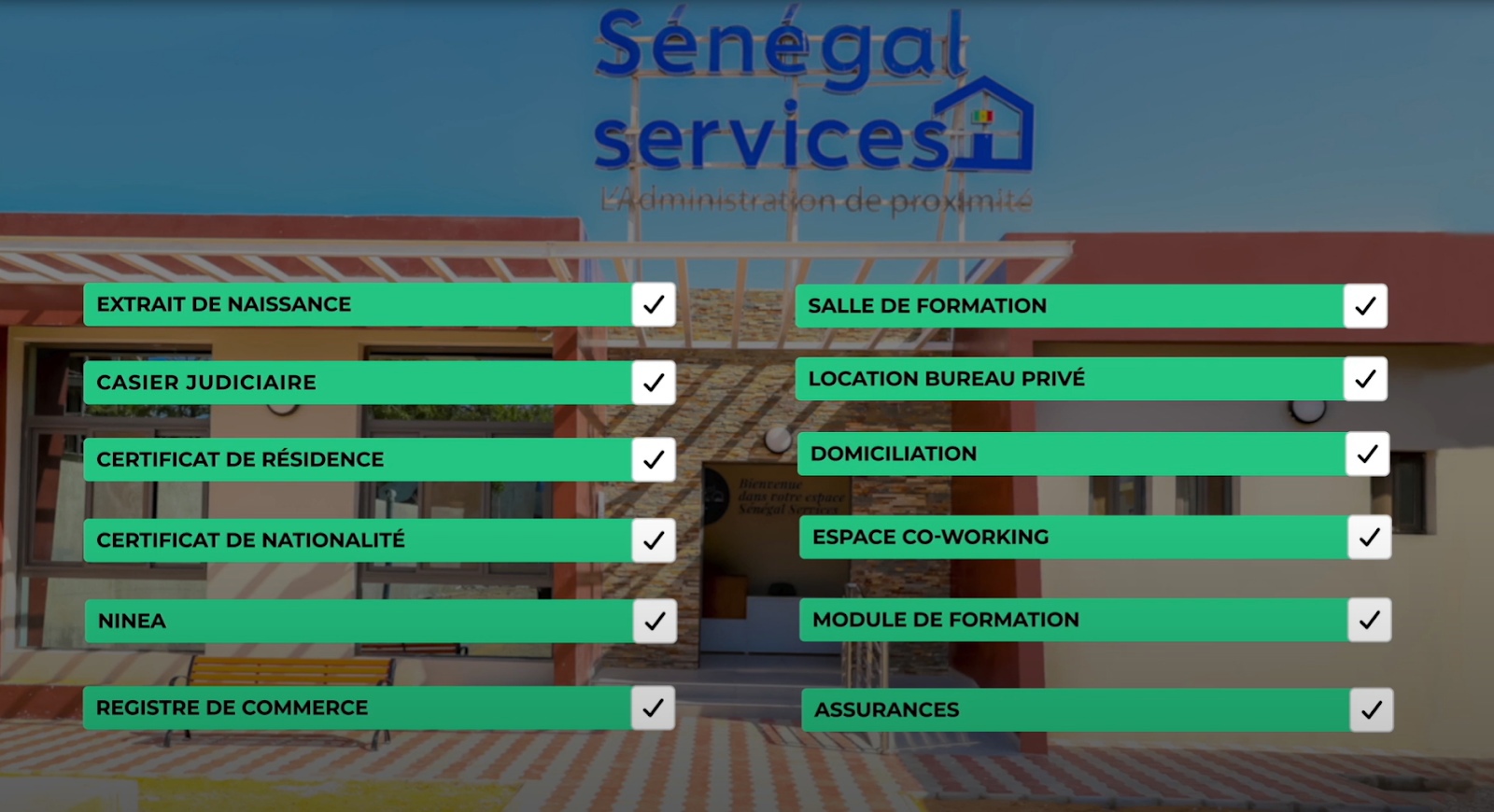
Source: Senegal Services portal (presentation of the portal on official Youtube channel)
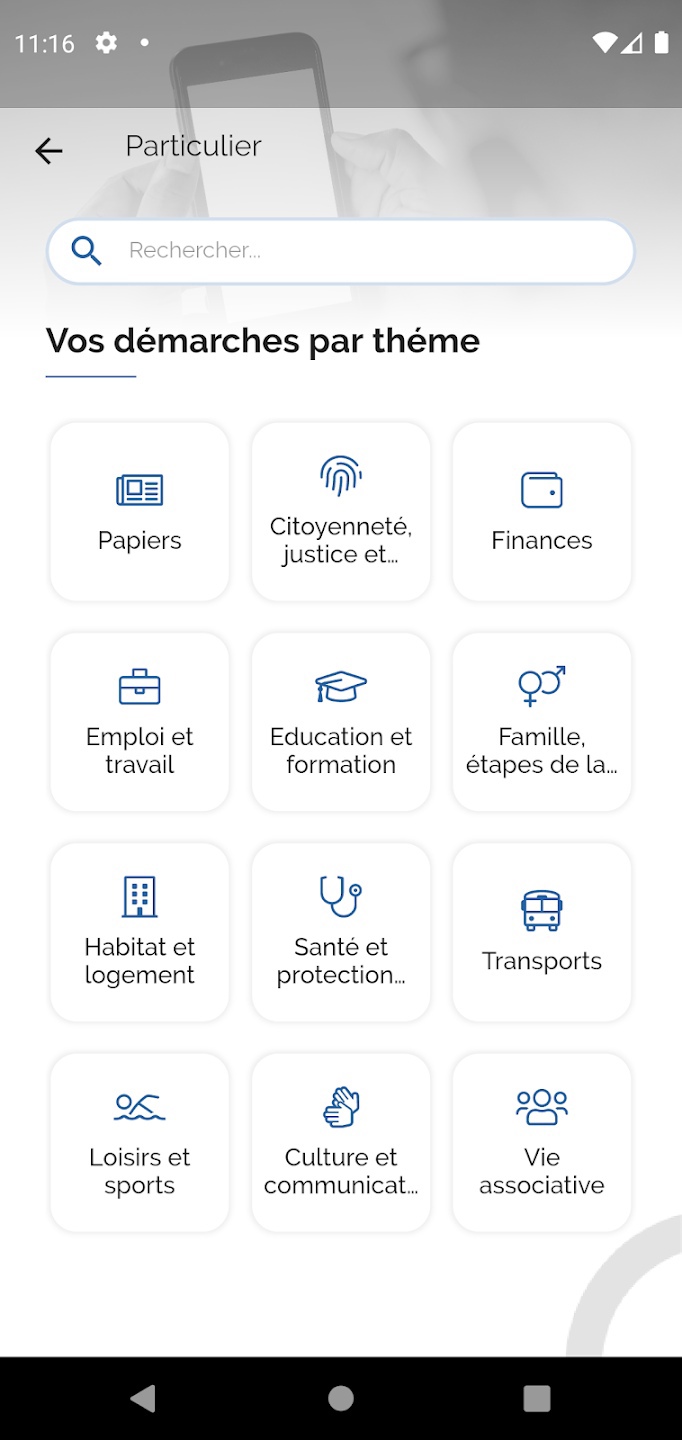
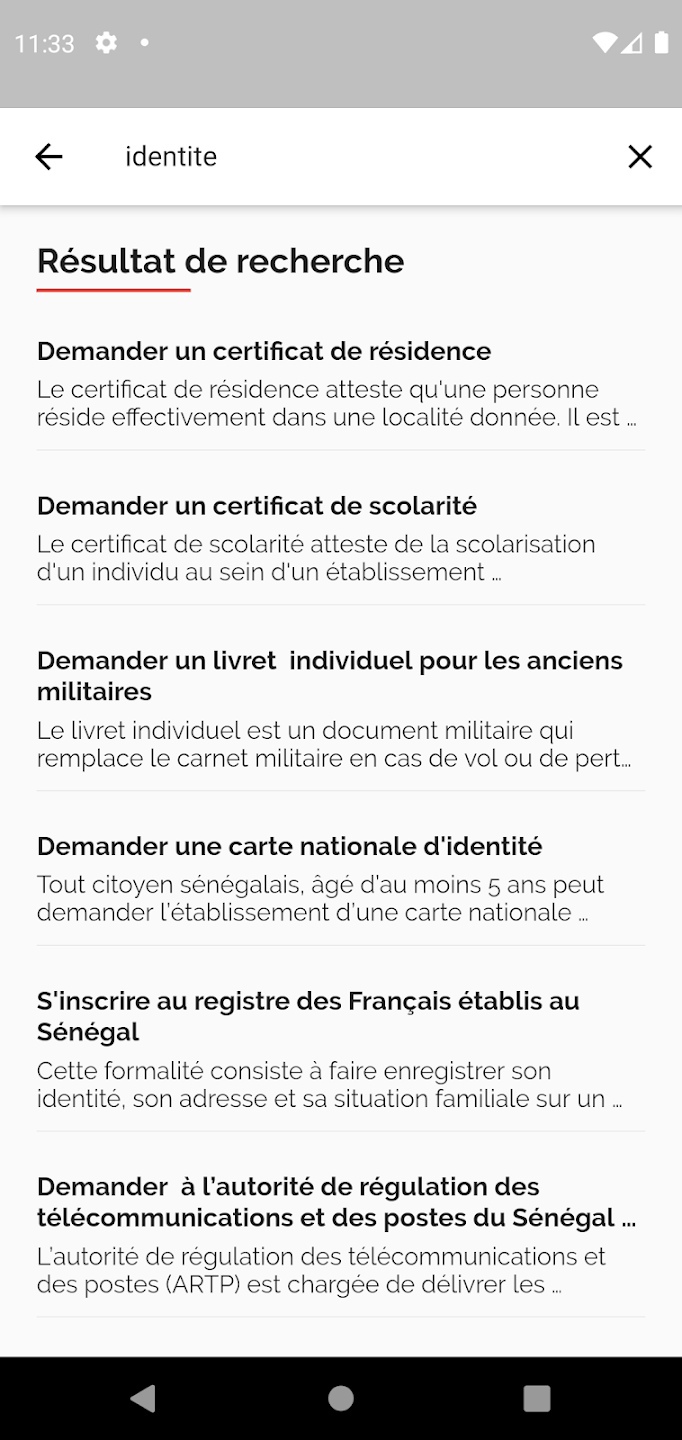
Source: Senegal Services app
Identification and Biometrics
In 2016, Senegal became the first country in ECOWAS to issue Biometric ID cards with the aim of facilitating intraregional migration. In continuation of this initiative, in 2022, the Senegalese Ministry of Digital Economy and Telecommunications in cooperation with the UNDP launched the National Digital ID (INN) project and is working on setting up a biometric population database. With a budget of 3.2 billion CFA francs (~5.1 million USD), the INN which is to be completed by 2024 will facilitate the authentication of citizens, improve the capacity and integration of government information systems.
e-Taxes
The eService (eTax) Platform provided by the General Directorate of Taxes and Domains (Direction Générale des Impôts et des Domaines, DGID) was designed to enable taxpayers to declare and pay taxes online. To access the web application, a registration with a Unique Tax Identification Number (NINEA) is required. Upon registration, an e-mail containing access details (login and password by default) will be sent to the user's tax centre.
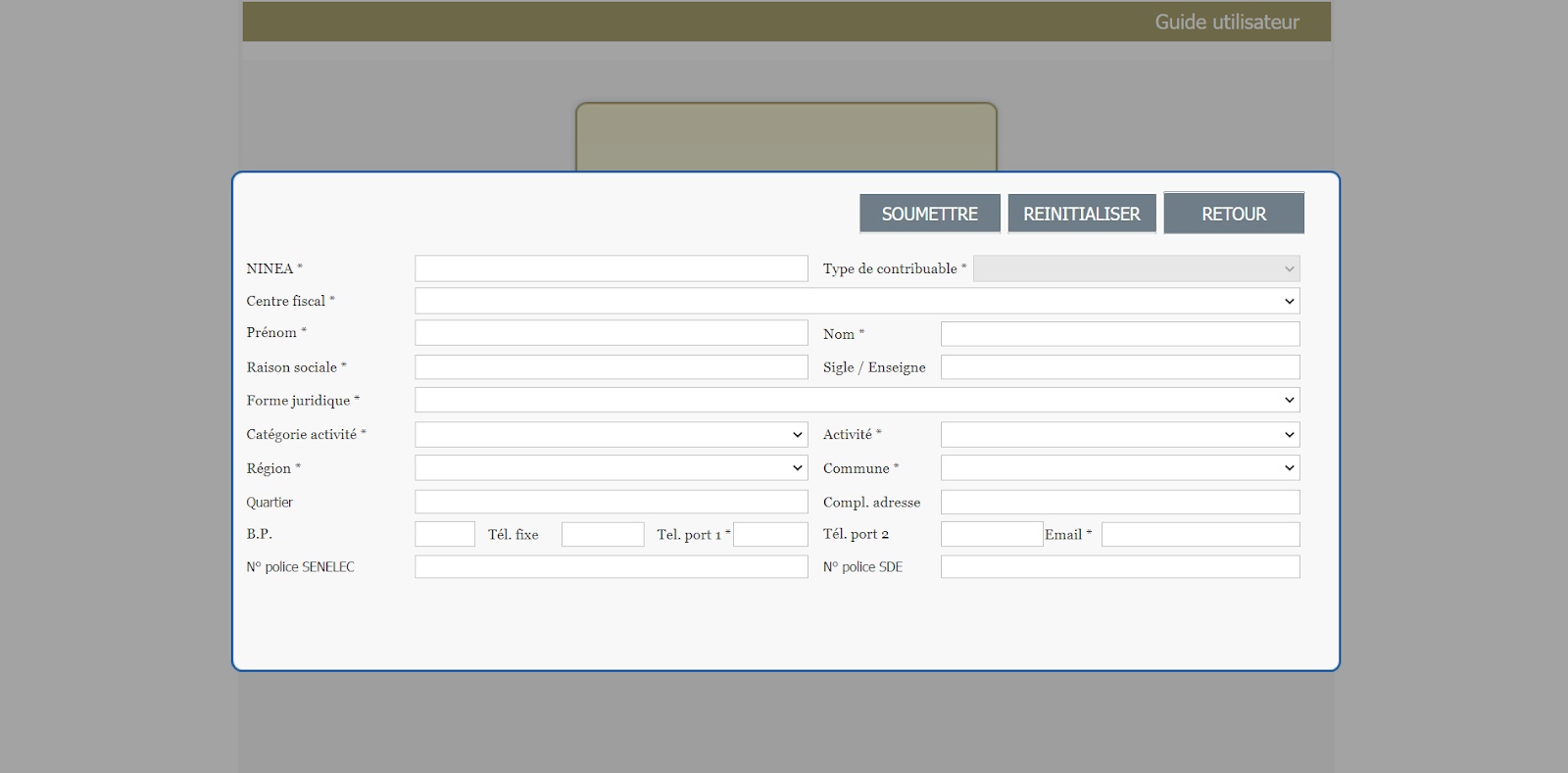
Source: eTax Platform by DGID (page for creating an account)
The e-services section of the DGID’s website lists a number of other digital platforms implemented by the agency, namely, Mon Espace Perso (allows users with turnover of less than 100 million CFA francs to have online access to tax files, to consult tax accounts, to declare taxes and duties), Sen-Etafi platform (enables the online filing of financial statements), PCF (used to check whether the importing person or a legal entity is subject to the tax compliance levy – PCF), allows downloading of declaration forms.
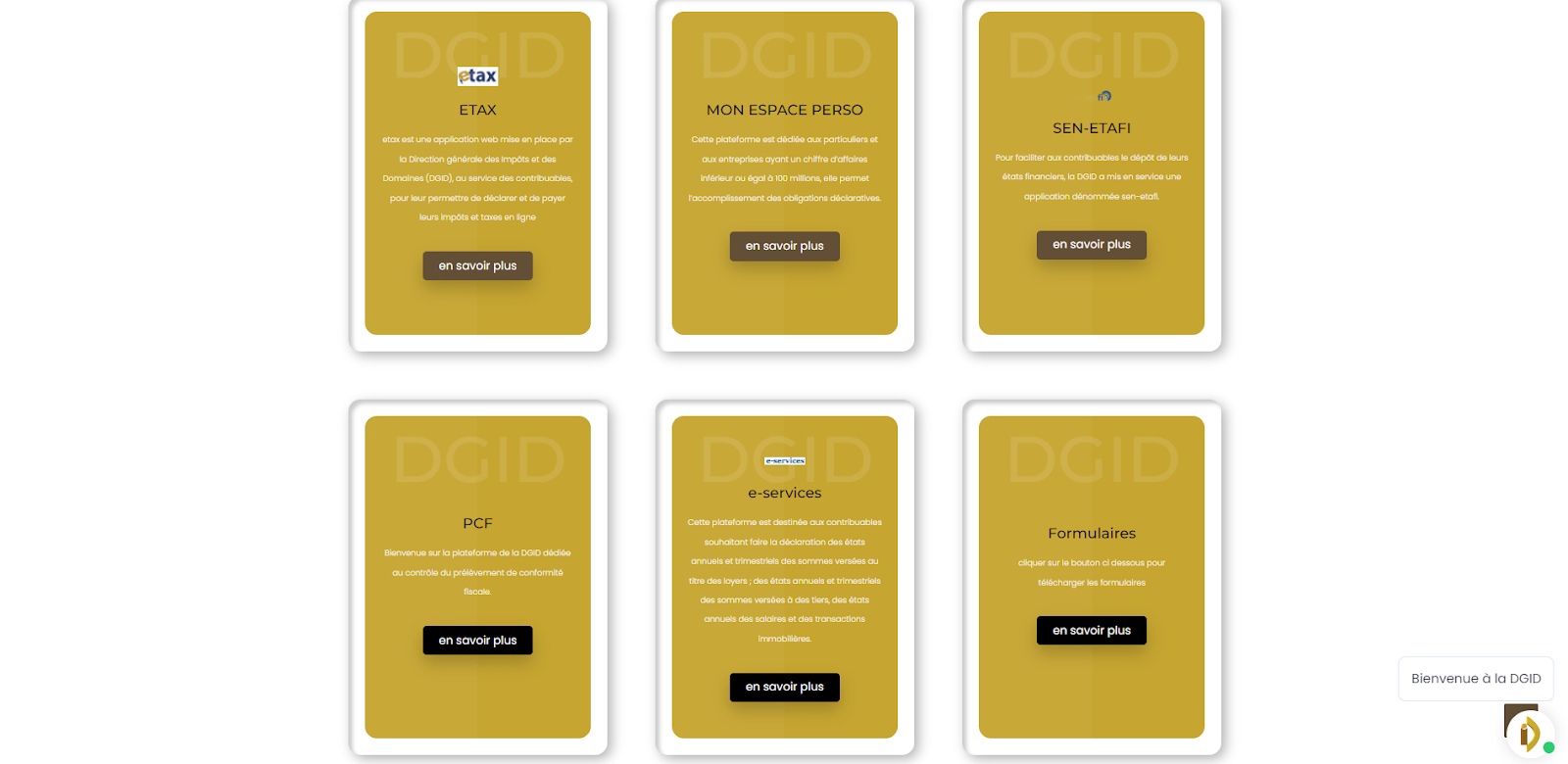
Source: DGID website (e-Services page)
Education
The adoption of ICTs is relatively high in the educational sector. In 2016, the Digital Resources For All project (Ressources numériques pour tous, RNPT) was launched to compensate for the lack of teachers. Under the project, 240 of 308 high schools in Senegal received tablets, digital classrooms, and other digital equipment with a total cost of nearly 1 billion CFA francs (1.7 million USD).
The Information and Management System of National Education (Système d'Information et de Management de l'Education Nationale, SIMEN) was introduced in 2016 as well in cooperation with Microsoft Africa. It allows to check attendance, grades, etc. The mobile application was also developed.
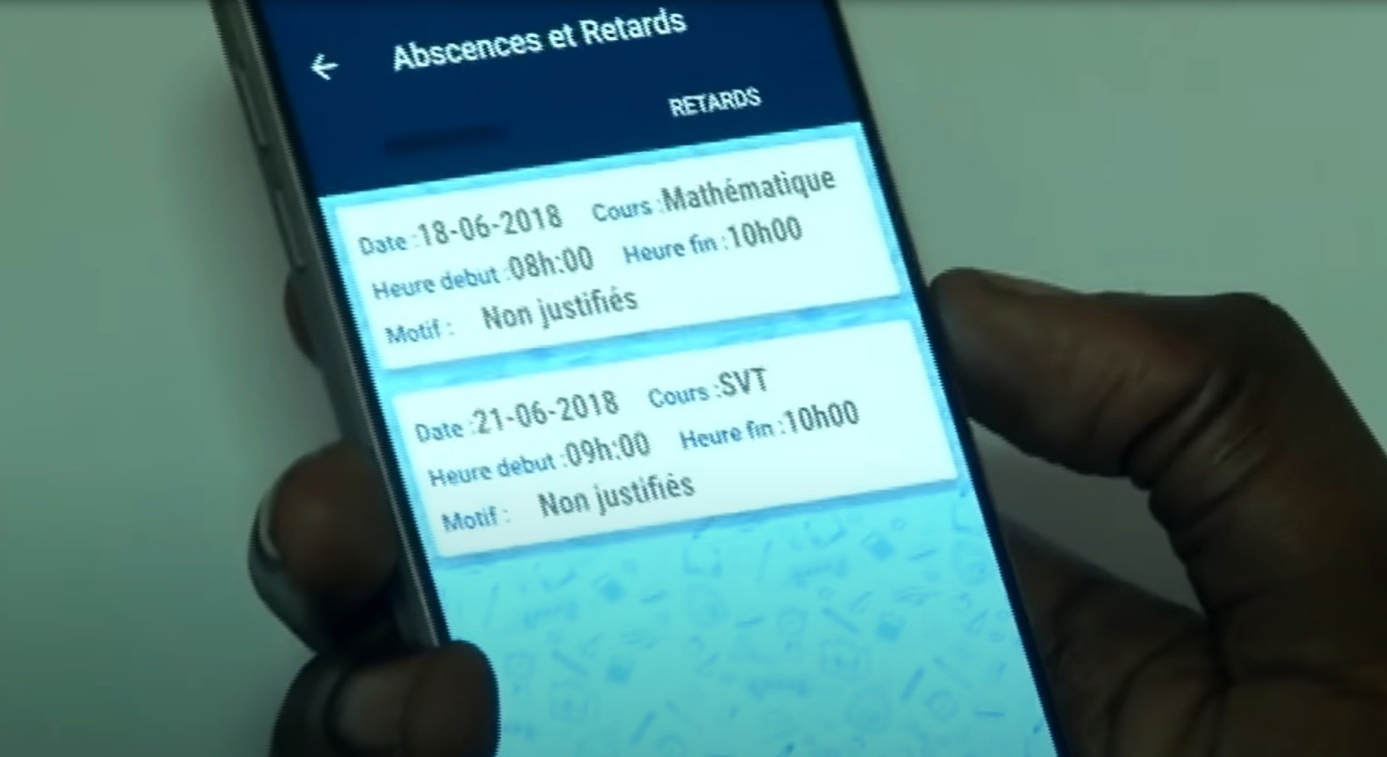
Source: Youtube 'Canal Education'
In 2018, the National Education Identifiers platform (plateforme des Identifiants de l'Education Nationale, IEN) was put into operation with support and funding provided by UNICEF and Japan (with a total investment of about 592 million CFA francs, or 1 million USD). The platform was introduced to allow the issuance of National Education Identifiers used for accessing the SIMEN, educational online resources and using professional emails.
The PROMET project led by the Ministry of Education for the Development of Distance education (Ministère de l'Education pour le développement du Télé-enseignement) provides a number of educational platforms, including the PROMET teaching and learning platform and the Canal Education platform with educational content for students of all education stages in the video format.

Source: PROMET (main page)
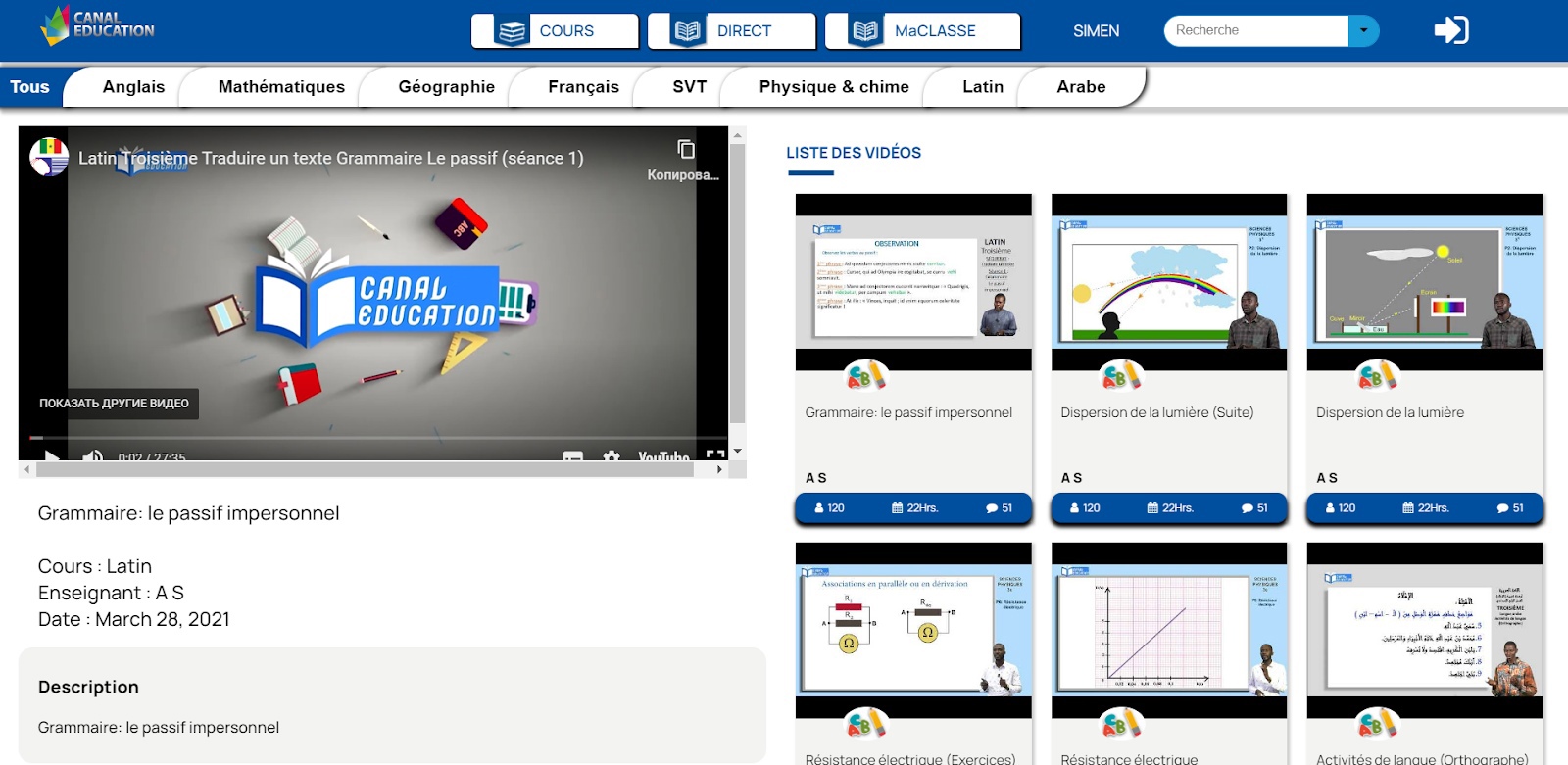
Source: Canal Education (main page for college level)
The platform Examen.sn was developed to help students prepare for exams and contains relevant tests and educational materials. However, some PDF files are not available (for instance, when trying to download the PDF of ‘Nature des mots prenoms’ the message ‘Missing or incorrect image file’ is displayed).
Healthcare
In order to improve the performance of the health system in Senegal, the Ministry of Health and Social Action developed the E-Health Strategic Plan 2018-2023. The Health and Social Card, Digital Health and Health Observatory Unit (CSSDOS) is the entity in charge of implementation of the Plan. Its website lists all available health facilities, yet does not offer any digital services.
The Health Information System of Senegal based on the DHIS2 system (District Health Information Software, an open-source platform developed and implemented under the leadership of the HISP Centre at the University of Oslo (UiO) in collaboration with its partners and used by 80 countries worldwide) was introduced in 2013 for collecting and reporting information on sanitary facilities. There is also the M-diabetes application launched in 2016 under the WHO and ITU’s ‘Be He@lthy Be Mobile’ programme. Users receive messages with useful information and recommendations. According to the 2015 research 'mDiabetes: A diabetes prevention initiative via mobile phones in Senegal', at the pilot stage of implementation, 1770 people received messages via service. The total amount reached 350,000 SMS, and the satisfaction level stood at 87.3%.
Local Governance
In July 2023, the Senegalese Local Development Agency (ADL) launched the E-Territoire programme in order to improve the quality of governance, inclusion, and the digitalisation of local authorities. Under the project, the E-Territory Days are held annually to discuss and support the adoption of ICTs by local authorities.
Citizens Participation and e-Elections
Regarding the civil participation services, a unified portal has not been developed, yet forms for complaints and appeals can be found on websites of a number of entities. Among the services to mention is the Diss'Eau project funded by AFD (France) and GRET aimed at strengthening citizen participation in the development of policies and monitoring of water and sanitation services. Under the project the Water and sanitation civil society organisations platform in Senegal (Plateforme des Organisations de la Société Civile pour l'Eau et l'Assainissement au Sénégal, POSCEAS) was created in 2018. The platform does not offer any digital services, only thematic reports.
Since 2022, citizens have the opportunity to consult the electoral file using their identification number. E-voting systems have not been introduced at any level. Among the projects concerning elections, it is worth mentioning the Senegal Vote, a digital programme for raising Senegalese citizens' awareness about the electoral process.
Public Procurement
Information about tenders is published on the Public Procurement Portal of Senegal (Portail des Marchés Publics du Sénégal). It allows document search by keywords and categories (e.g. agriculture,sanitation and waste removal, service delivery, etc.). Procurement plans are published from 2020, the tenders – from 2022, whereas the statistics on awarded contracts and procurement plans are available from 2007/2008. The portal does not provide for a personal account and does not enable applying for a tender.
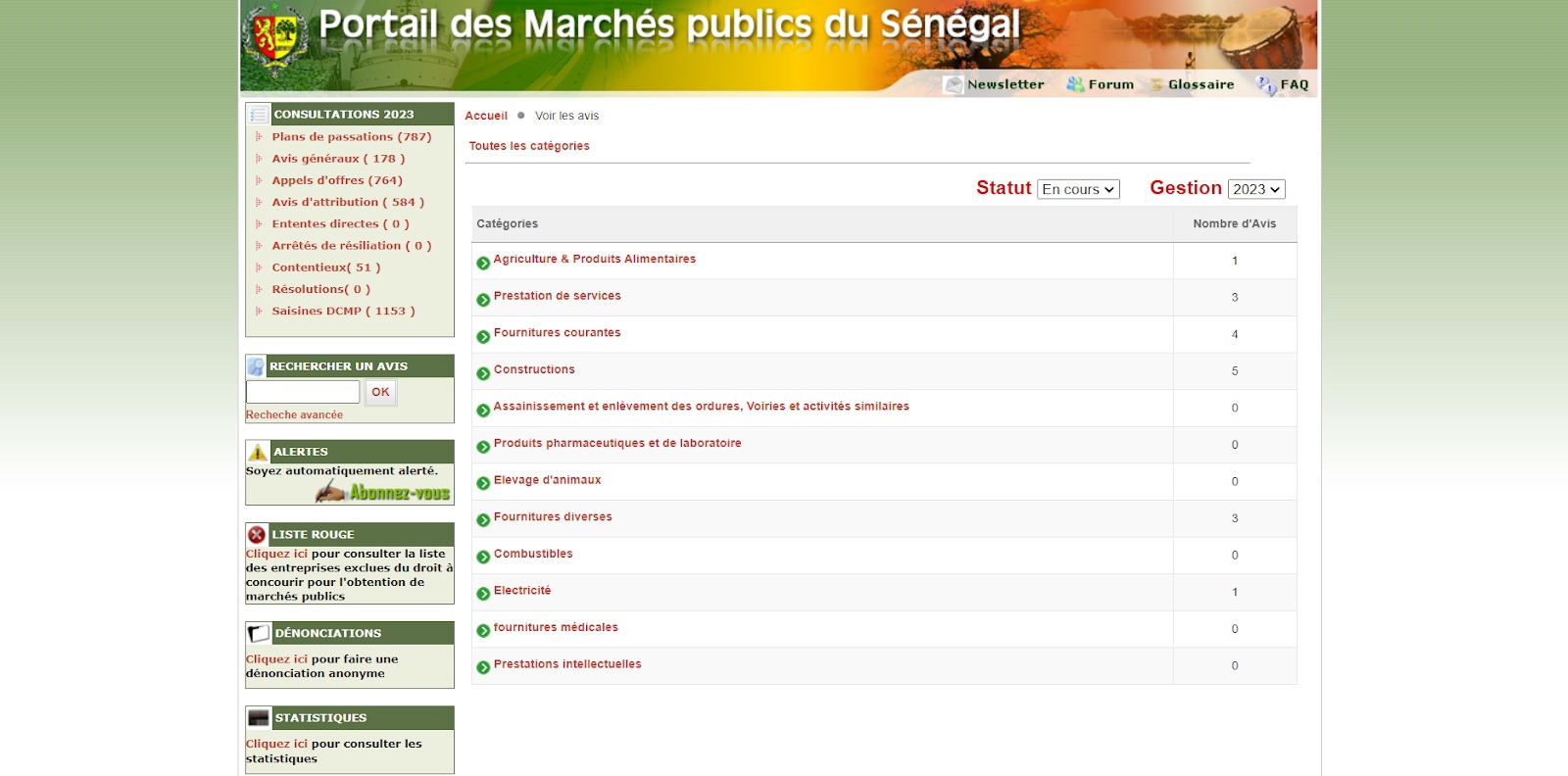
Source: Portail des Marchés Publics du Sénégal (all categories)
Agriculture
Being among the sectors with the largest share of employment in the country (nearly 22% of the population, according to the World Bank), the agricultural sector is still at a basic level of ICT adoption and implemented initiatives are often experimental.
The Yeesal Agri Hub project officially established in 2017 and supported by GIZ, FAO and others aims to provide services to those interested in agriculture and to support rural initiatives, promote ICTs adoption in the sector. Over the period 2017-2021 the project invested nearly 300,000 EUR in agripreneurship. Among its initiatives to mention are Agripreneur en Action II, Disrupt Agri-I, Future Farmers of Africa-II, etc. However, digital services have not been implemented under the project yet.
Furthermore, much attention is paid to addressing climate change via adopting digital solutions. Thus, in 2017, FAO and World Meteorological Organisation launched the Digital Innovation to Tackle Climate Change Project in Rwanda and Senegal in order to improve their capacity to provide meteorological and climatological forecasts related to agricultural practices and facilitate farmers and fishers’ access to information.
Authors:
Dione Assane
Olesya Kalashnik
Have you spotted a typo?
Highlight it, click Ctrl+Enter and send us a message. Thank you for your help!
To be used only for spelling or punctuation mistakes.
